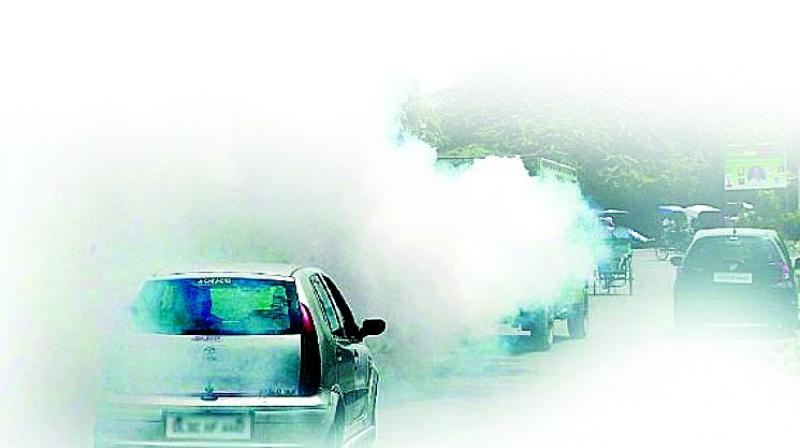So, let's talk green: Pollution Killing them softly
It is very clear that most of PM 2.5 is from burning diesel as a fuel for vehicles on the road.

I dread riding out on my bike without my face mask, driving out in my car without all the windows up and the air conditioners on, going on long walks on the streets. All this because I know that the air we breathe, is deadly mainly because of emissions from vehicles. When I watch couples on their motor bike, with small kids and infants, my heart goes out to them, as I imagine the damage that is being caused to their tender lungs. Whenever I see cops on the road, desperately trying to control the chaotic traffic, my heart goes out to them, as I know the damage that is being caused to their health.
Every day there is new research, that raises even more dangerous issues, that we cannot ignore, must not ignore. Now there is new research from the William Harvey Research Institute at Queen Mary University of London which has linked exposure to Particulate Matter (PM)2.5, which are fine particulate matter that is in the air to heart damage.
The term fine particles, or particulate matter 2.5, refers to tiny particles or droplets in the air that are two and one half microns or less in width. The widths of the larger particles in the PM 2.5 size range would be about thirty times smaller than that of a human hair. The smaller particles are so small that several thousand of them could fit on the period at the end of this sentence.
Particles in the PM 2.5 size range are able to travel deep into the respiratory tract, reaching the lungs, which causes a host of health problems that include, eye, nose, throat and lung irritation, coughing, sneezing, runny nose, shortness of breath. It can also affect lung function and worsen medical conditions such as asthma and heart disease. Studies also suggest that long term exposure to fine particulate matter may be associated with increased rates of chronic bronchitis, reduced lung function and increased mortality from lung cancer and heart disease. It is very clear that most of PM 2.5 is from burning diesel as a fuel for vehicles on the road.
As explained by Dr. Nay Aung, the lead author, a cardiologist and Wellcome Trust research fellow at William Harvey Research Institute at Queen Mary University of London, UK., the new research observed harmful changes to heart structure: “We found that as PM 2.5 exposure rises, the larger the heart gets and the worse it performs. Both of these measures are associated with increased morbidity and mortality from heart disease.” About the mechanisms involved, Dr. Aung simply commented that exposure to PM2.5 results in systemic inflammation, vasoconstriction, and heightened blood pressure levels — all of which can increase the pressure in the heart, and result in enlargement, in order to deal with the overload, and thus a reduction in contractile efficiency.
Dr. Aung continued: “We found that the average exposure to PM 2.5 in the UK is about 10 µg/m3 in our study. This is way below the European target of less than 25 µg/m3 and yet we are still seeing these harmful effects. This suggests that the current target level is not safe and should be lowered.” Contrast this to PM 2.5 levels in a city like Bangalore – where it is never below 28 µg/m -40 µg/m in areas where it is measured, sometimes going up to 78 µg/m to 100 µg/m.
All this pollution is slowly killing the citizens for no fault of theirs. What will happen of people who cannot avoid all the good suggestions – walking on the streets every day to work or to the bus stop, going in open autos, on their bikes, in buses that have open windows? What will happen to the police that are constantly exposed to this?
So what do we do about this? Can we stop the pollution over night? All we can do is to avoid times and places where there is a high level of pollution. If you want to cycle into work and there is heavy traffic around that time then try to find a quieter route. Walk on the part of the pavement furthest from cars to reduce the amount of pollution you breathe in. And then pray for the souls all those who we are killing softly.
The writer is an author, speaker, trainer, consultant, an entrepreneur and an expert in applied sustainability. Visit: www.CBRamkumar.com

